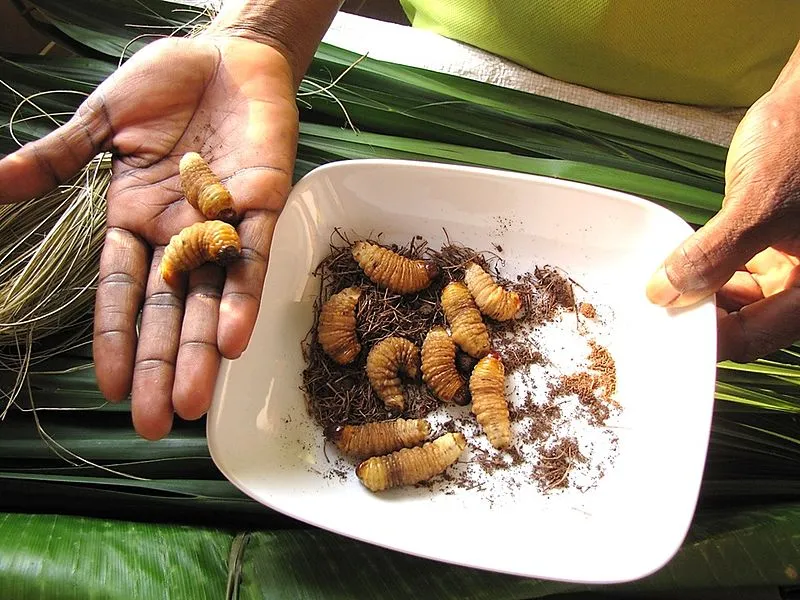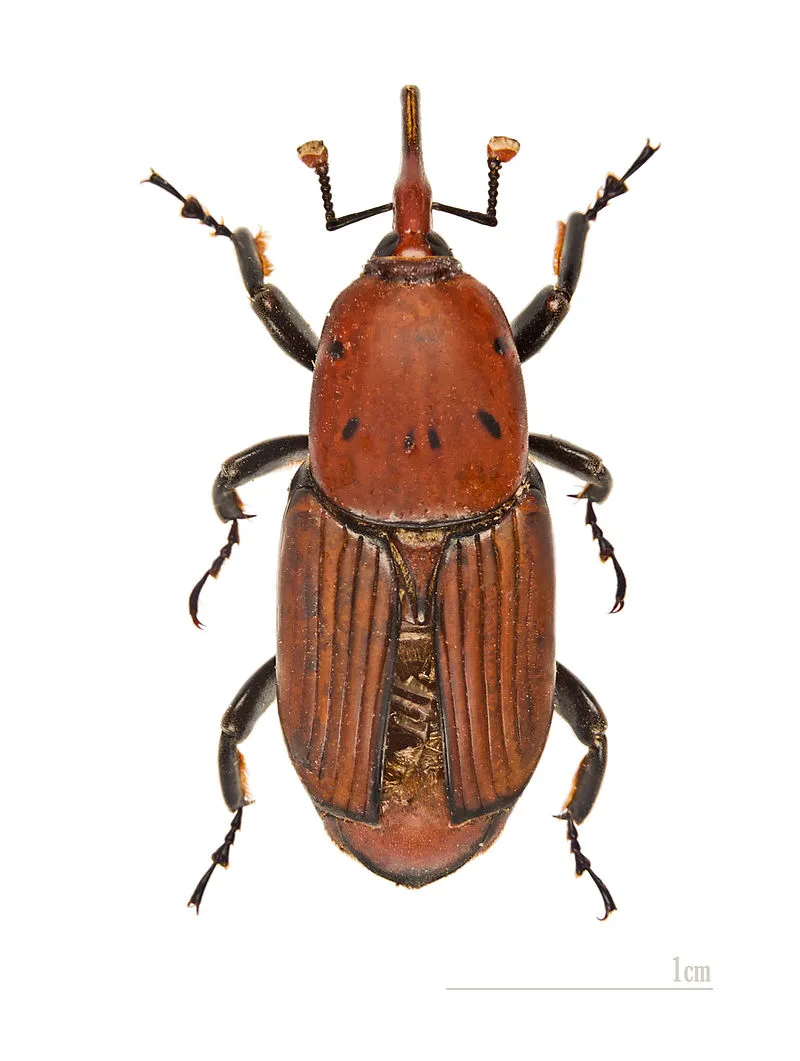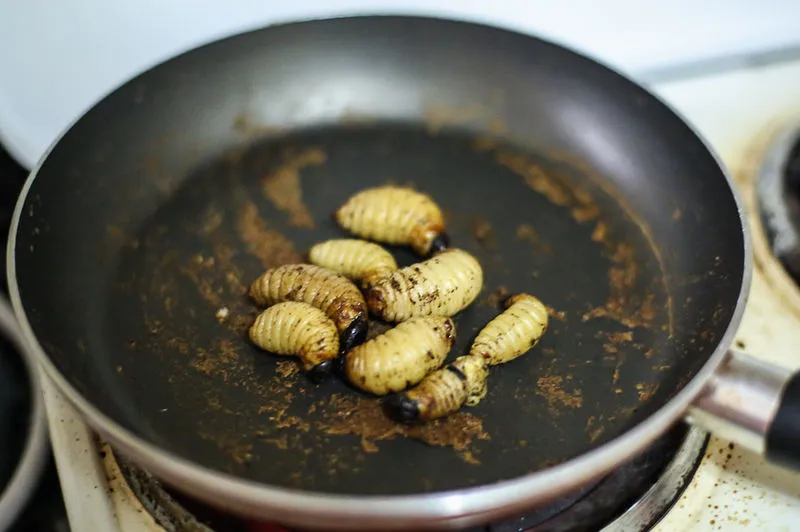While you take time to digest some of my long and heavy post, let's take little time to visit what nature has left for us. As time goes on we will get to be seeing some traditional foods of health benefits as well advancements in science and technology in my main articles. For the time being, let's visit nature.
There are some plants and animals of value when consumed. We will look at the one I have practically prepared and tasted. Welcome to Africa. I will succinctly talk about their life cycle, their associated environment, how they are processed for consumption and finally how they are of health benefit to man. Today we will delve into the world of sago worms scientifically known as Rhynchophorus ferrugineus - the edible larvae of red palm weevil. They are also refered to as coconut worms.
I want to believe you are not already disgusted getting to know that some worms are actually edible. Well, it's quite a reality you just have to accept, yes Sago worm is edible and has a lot of health benefit. I have tasted it and I can confidently say it very sumptous. Lets continue, you will find out a whole lot about them.
How do sago worms come about?
Sago worms are the larvae of Red Palm weevil. They evolve from the egg laid by the adult form of the insect known as Rhynchophorus ferrugineus
Scientific classification
Kingdom: - Animalia Phylum: - Arthropoda Class: - Insecta Order: - Coleoptera Family: - Curculionidae Genus: - Rhynchophorus Species: - R. ferrugineus
As you know, insects undergo two major type of transformation or morphological changes - complete and incomplete metamophorsis. Metamophorsis simply means the transformation or change in the body structure or form of a living thing (especially insects). It is a kind of developmental life cycle an insects must undergo to mature into an adult form.
The complete metamorphosis is made up of four stages that begin with the egg stage of the insect which later is transformed into larva ( very ravenous and active), from larva to the pupa (inactive) stage and finally to the adult form of insect. The incomplete metamorphosis on the other hand is made up of just three stages, the egg stage, nymph (almost looks like the adult but immature) and the adult form.
I guess you can pinpoint the main difference between the two. The complete metamophorsis occurs mostly in ants, fleas and wasps etc while the incomplete metamophorsis occurs in cockroaches, termites and praying mantis etc.
The larvae of the red palm weevil are very ravenous and can eat very deep into palm trees due to their powerful mandibles. They eat deep into most times palm trees especially palm oil and coconut trees. They dig holes of about a meter into the trunk of palm tree consequently weakening and killing the plant at the end.
They continue to degrade and at the same time sucking up the juice in the palm tree to survive and develop. They virtually survive inside the dead palm tree until they are about transforming into the the pupa form where they become inactive and form a pupa before transforming into an adult form of the weevil.
How to catch sago worms
It is very easy to catch them, locate any dead palm tree be it palm oil or coconut tree, they are always found there most times. You first use an axe to break up the palm tree focusing more on the bottom and soft region of the palm. You have to penetrate the palm tree through the most soft region or moist region, reason is that, they thrive more and better in the juicy region of the plant and this is at the centrer. You will definitely find them deep within the core of the palm tree. Once you see the, you pick them out and transfer into a container to hold them.
How to process them
Well this might sound really disgusting laughs.... You can either eat the worm raw or fry them with or without oil. Some people eat it raw just the way they are while some people fry it. Some would prefer to suck the juicy content of this worms, but for me, it is a no no. I prefer to process them, by frying them directly using a frying pan without oil.
Naturally ,they contain high amount of fatty acids especially oleic acid (40.1%); and linoleic (n-6) (13.0%), so there is no point still using oil to fry them. They are more sweeter when fried on an empty pot rather than using oil. It takes roughly about 5minutes to fry them. The aroma that come from the frying process alone will make you salivate and hunger for more of them, really they are tasty and sweet. Once done frying, whoola, your protein and carbohydrate rich meal is ready!
overal general and health benefit of sago worms
Over time I have come to understand and realise that we are not only the ones that like the consumption of sago worms. It will interest you to know that, these sago warm are also being consumed in other part of the world. It has even gotten to the extent that companies now produce a sacthet contain processed sago worms.
On a normal, a 1g/100gram dry weight of processed sago worms will give the following nutritional benefits given below:
Nutritional Composition Sago Worm Larvae (g/100g dry weight)
Protein 25.8g Fat 38.5g Ash 2.1g Carbohydrates 33.2g Energy (kcal) 583
Amino Acids (g/100g dry weight)
Aspartic acid 2.29g Threonine* 1.15g Serine 1.33g Glycine 1.04g Alanine 1.37g Valine* 0.81g Methionine* 0.27g Isoleucine* 0.75g Leucine* 1.62g Tyrosine* 0.97g Phenulalanine* 0.73g Histidine* 1.02g Lysine* 1.72g Arginine 1.62g Tryptophan* 0.23g *Essential amino acid
As you would observe, it contains virtually almost all the essential protein amino acids needed by the body system for normal functioning. It also contains minerals such as calcium. As of now, there has been no report about any side effects with sago warms
Traditionally, sago worms provide source of food and income for the the peasant farmers in rural areas and villages. Sago warms have been shown to have almost same nutritional protein constent as found in soya. They contain low cholesterol.
In conclusion, sago worms could be quite one of the most disgusting meal to eat but still sweet when tasted. It is the most important food of Borneo - an island in Asia. This simply means, its consumption is not only limited to Africa, rather it is also consumed in other continents.
To see videos and live worms in the palm and know more about Sago consumption in Borneo, click here
Until nex time!
References
https://www.thestar.com.my/news/community/2014/09/08/sago-larvae-a-must-try-delicacy-dried-smoked-grilled-or-eaten-alive-the-worm-is-easy-to-find-at-muk https://www.google.com/amp/www.mysabah.com/wordpress/sago-worm-butod/amp/ http://www.mysabah.com/wordpress/sago-worm-butod/ https://www.researchgate.net/publication/320891750_Sago_worms_as_a_nutritious_traditional_and_alternative_food_for_rural_children_in_Southeast_Sulawesi_Indonesia https://www.thailandunique.com/edible-insects-bugs/edible-sago-worm-larvae https://en.m.wikipedia.org/wiki/Rhynchophorus_ferrugineus
Return from The edible natural sago worms and their health benefits to cyprianj's Web3 Blog




